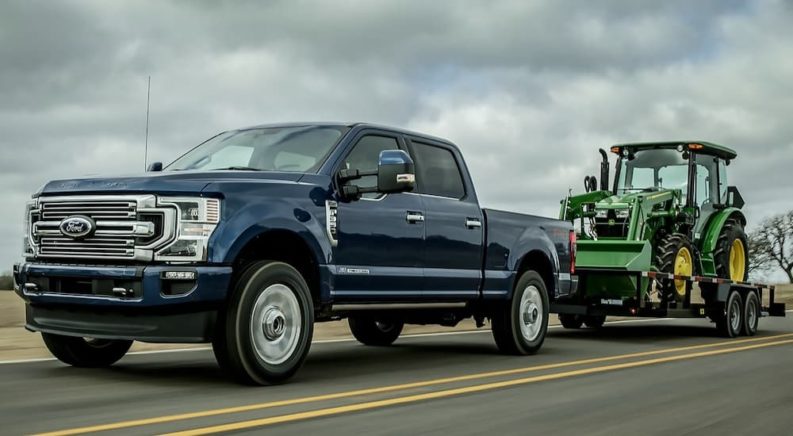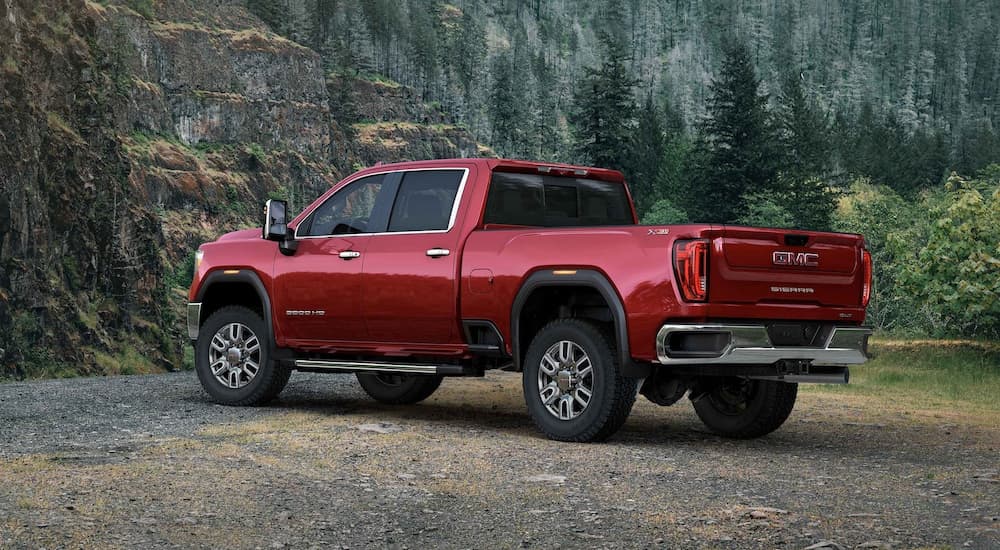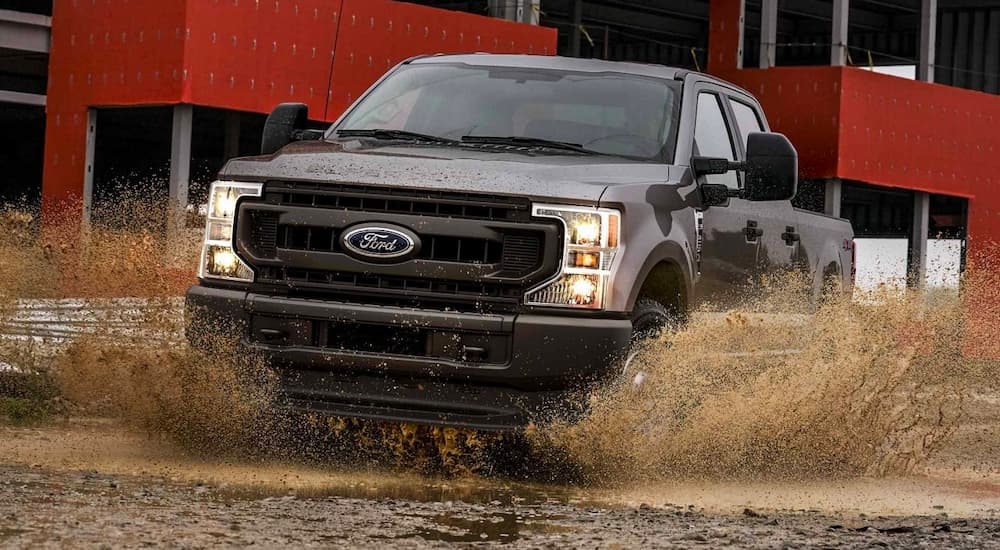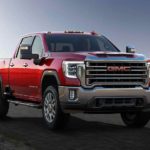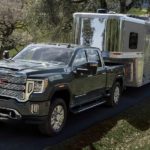It’s sometimes surprising that heavy-duty pickup trucks are street legal given their meaty capabilities and outsized dimensions, but as America continues its obsession with supersizing everything, a contingent of truck buyers is opting for these mammoth machines as everyday drivers. The 2022 Ford F-350 vs 2022 GMC Sierra 3500 HD is a battle of the brawn we’re all watching as this newest trend emerges. Which of these pickups is the better choice isn’t as important as understanding why buyers who don’t need more capability are choosing trucks typically reserved for commercial use. They appear willing to take the fuel economy hit, so from that, we can hypothesize that budget isn’t a big concern. Is it all about image, or do we simply apply the old adage bigger is always better?
Truck buyers tend to fall into specific socio-demographic silos: folks that need work-oriented utility, off-roaders, and the last and largest contingent, groups that just like trucks. It’s this group that has our attention. What are their primary motivators? Owning a big truck is not for everyone, but what makes it the ideal option for those who aren’t necessarily going to use its proper capability?
The Who, What, When, and Where of HD Truck Buyers
We’re guessing there aren’t a lot of urban dwellers in the pool of prospective HD truck owners since parking these beasts indoors requires complex math (is the height max posted in parking garages really the max?). Additionally, navigating busy city streets any more than very occasionally is an exercise in physics. Instead, we think this recreational HD truck owner lives in suburbia or out in the country.
Overall, the pickup truck market is exploding. Experian reports that Ford continues to dominate, capturing the most market share of any truck brand in key truck-friendly states like Texas, Georgia, and North Carolina. From an income perspective, the largest percentage of buyers report a $250k – $350k annual household income, which means these buyers are pretty well-off.
HD truck buyers value mass and are therefore more likely to add aftermarket accessories, such as lift kits, to their rigs. Their size is intimidating to mere mortals, like bicyclists and every kid on the planet, but since 2020 marked the year that pickups officially outsold passenger cars for the first time ever, there’s no looking back. We can’t ignore the pickup truck’s design evolution either. Today, 85% of trucks sold contain a crew cab, indicating a preference for people-hauling, not payload.
For some, the HD truck is a weekend rig reserved for towing the boat to the lake house. Infrequent use may mean these recreational drivers aren’t as familiar with the unique challenges of maneuvering a massive truck. However, these challenges are not going to stop people from spending ridiculous amounts of money on a decked-out and powerful truck that they really want but don’t necessarily need.
Most HD Truck Buyers Don’t Need Heavy Duty Capability
Disregarding need for a moment, let’s delve into the why factor. Why would a buyer choose a truck with capabilities they’ll never need? In a March 2021 Car and Driver article, writer Ezra Dyer explores this disconnect further, reminding HD truck enthusiasts that ownership has almost as many downsides as it does privileges. From parking woes to visibility challenges, it’s a reminder that a willingness to compromise convenience is part of the list of considerations.
Since these trucks are designed for heavy payload and gooseneck trailer towing, they ride differently without cargo. For all intents and purposes, these trucks are designed for commercial-grade capability, not daily commuting. The trade-off for buyers is overall nimbleness and a shockingly large reduction in fuel economy.
Not only is ride handling and quality an issue, but navigating busy streets will feel a lot like a scene from the old Godzilla vs King Kong movie. If you’re not careful, you’ll inadvertently take out a stop sign with your rear fender while executing a right turn. For many HD truck fans, none of this matters. They’ll take the hit to practicality.
It’s interesting that the idea of all that capability is enough to sway buyers. Perhaps it’s the massive influx of half-ton pickups showing up in the carpool line that has rendered them less brawny. That the F-150 has become the new family car is off-putting to some pickup truck loyalists.
What About Climate Change?
The thing is, HD trucks are gas (or diesel) guzzlers. Attempts to ‘greenify’ their required power plants are helping, but the fact remains that fuel economy falls far below that of a more reasonably sized SUV. Let’s not forget that we’re entering the electrification era. The brand new all-electric half-ton F-150 Lightning is actually more powerful than any F-150 ever built before, causing diehard big block motor loyalists to take a second look at alternative fuel powertrains.
The emergence of other massive battery-powered trucks like the GMC Hummer also bode well for a future that includes zero-emissions HD pickups. Rising fuel efficiency will likely trigger a new wave of interest in giant commercial-grade rigs. It’s funny, then, that modern urban planning is focused on a downsized aesthetic. Anyone that has tried to shoehorn a truck into a shopping center spot can attest to this. These spots are shorter and narrower than ever before.
Utopian urban planning theory favors a largely pedestrian-only model, but in the interim, while Americans still love their sheet metal, the compromise seems to be miniaturization; not good news for the guy in the 7’ wide F-350. It’s surely maddening to see a giant pickup occupying four spaces at your local Costco, but what choice do they have? To be fair, it’s impossible to squeeze a heavy-duty pickup into a single parking spot. It’s ironic that a retailer like Costco makes us buy 75 rolls of toilet paper but structures its parking lots as though we’re all driving Smart Cars. So, while modern city planning doesn’t necessarily support the big truck lifestyle, enthusiastic owners will always find a workaround.
Is an HD Truck Worth the Trade-Offs?
If you find yourself in the enviable position of having a spare $75,000, you might be facing the light-duty vs heavy-duty conundrum. If so, ask yourself what your daily driving requirements look like before you decide. Another consideration is garage space: if you’re dealing with a parking garage or a constricted lot in your condo community, prepare for daily parking aggravation.
Assuming you’re shopping for a daily driver, your next consideration is the cost of ownership. As of the 2021 model year, you can’t find a heavy-duty pickup that publishes fuel economy ratings. These are trucks with commercial grade GVWRs, and their original purpose is not for commuting. As such, you’ll need to do some google sleuthing to determine ownership costs.
After that, the debate boils down to aesthetics. If you like big trucks, that may be all it takes to opt for a heavy-duty model. Assuming parking and gas costs aren’t big hurdles, the downside is mostly about how well you’ll fit in. Some folks are anti-big trucks because sharing the road with an HD pickup is fear-inducing.
Bottom line: buy that HD pickup if it’s really what you want. Just remember that you’re sharing the road with drivers that are behind the wheel of substantially smaller vehicles. As the bigger vehicle, the onus is on you to drive considerately. Also, try not to take up four spaces in the Costco parking lot.

